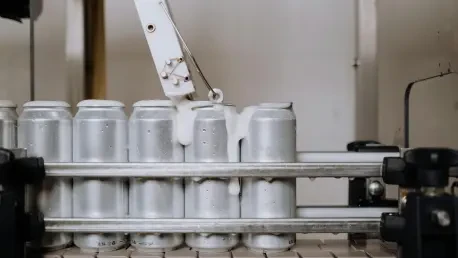Setting the Stage: A Packaging Revolution Unfolding in Japan
Japan’s packaging sector stands at a pivotal crossroads, driven by an e-commerce boom that has seen online sales skyrocket and logistics demands intensify, with the nation processing millions of packages daily. Inefficiencies in packaging processes can cost businesses dearly in both time and resources. This dynamic market, renowned for its high standards and cultural emphasis on precision, faces a dual challenge: meeting the relentless pace of consumer expectations while adhering to stringent environmental regulations. The strategic partnership between CMC Packaging Automation, a global pioneer in right-sized packaging solutions, and Correns Corporation, a key distributor of industrial machinery in Japan, emerges as a transformative force. This analysis explores how their collaboration is poised to redefine market trends, drive automation, and champion sustainability in one of the world’s most sophisticated logistics hubs.
Market Dynamics: Dissecting Current Trends in Japan’s Packaging Sector
E-Commerce Surge Fueling Automation Demand
The explosive growth of e-commerce in Japan has fundamentally altered the packaging landscape, with online retail platforms pushing for faster, more efficient delivery systems. Businesses are grappling with the need to handle diverse product sizes and shapes while maintaining cost-effectiveness. Automation, particularly through technologies like right-sized packaging systems, has become a critical solution, reducing manual labor and minimizing errors. The alliance between CMC and Correns taps directly into this trend, offering advanced machinery that tailors packaging to exact product dimensions, thereby slashing material overuse and shipping costs. As consumer behavior continues to shift toward online shopping, the demand for such automated solutions is only expected to intensify over the coming years.
Sustainability Pressures Shaping Industry Standards
Environmental consciousness is deeply ingrained in Japanese culture, and this ethos extends to corporate practices, especially in packaging. Regulatory frameworks are increasingly stringent, pushing companies to reduce plastic usage and lower carbon footprints. The collaboration between CMC and Correns aligns with these priorities by promoting right-sized packaging that cuts down on excess materials and void fill, directly contributing to waste reduction. Market data suggests that businesses adopting sustainable practices gain a competitive edge, as Japanese consumers often favor brands with green credentials. This trend underscores a broader shift toward eco-friendly innovation, positioning the partnership as a potential leader in setting new benchmarks for the industry.
Labor Shortages Driving Technological Adoption
Japan’s aging population and resulting labor shortages present another significant challenge for the logistics and retail sectors, where manual packaging processes are labor-intensive. Automation offers a viable path forward, allowing companies to maintain output with fewer workers. The CMC-Correns partnership addresses this issue by introducing scalable technologies that streamline operations, from carton assembly to final sealing. While larger enterprises can absorb the initial investment in such systems, smaller players face barriers due to cost constraints. This disparity highlights an emerging market gap that could be bridged through tailored financing options or modular solutions, a space where local expertise from Correns could play a pivotal role.
Future Projections: Mapping the Path Ahead for Packaging Innovation
Technological Advancements on the Horizon
Looking forward, the integration of cutting-edge technologies like AI-driven packaging optimization is set to revolutionize Japan’s packaging sector. These advancements promise to further enhance precision in material usage and predict demand patterns, reducing operational inefficiencies. The partnership between CMC and Correns is well-positioned to lead this charge, leveraging global innovation to meet local needs. Projections indicate that by 2027, a significant portion of logistics providers in Japan could adopt such smart systems, driven by competitive pressures and the need for agility. This technological wave represents not just an opportunity but a necessity for businesses aiming to stay relevant in a rapidly evolving market.
Regulatory and Economic Influences Shaping Growth
Economic factors, including rising operational costs, coupled with regulatory pushes for sustainability, are expected to accelerate the adoption of automated and eco-friendly packaging solutions. Policies aimed at reducing single-use plastics are likely to intensify, compelling companies to rethink traditional packaging methods. The collaboration under analysis offers a proactive response, with systems designed to minimize environmental impact while maintaining profitability. Market forecasts suggest that firms failing to adapt to these dual pressures may lose ground to competitors who embrace innovation. This underscores the strategic importance of partnerships that can navigate both economic and regulatory landscapes effectively.
Global Influence of Japan’s Packaging Model
Japan’s role as a logistics hub with exacting standards positions it as a potential influencer of global packaging practices. The success of initiatives like the CMC-Correns alliance could serve as a blueprint for other markets, particularly in regions with similar e-commerce growth and sustainability goals. Analysts predict that hybrid models—combining international technology with localized implementation—will become a dominant trend worldwide. As Japanese businesses demonstrate the tangible benefits of automation and waste reduction, their approaches may inspire broader industry shifts, amplifying the impact of this partnership beyond national borders. This global ripple effect highlights the stakes involved in transforming Japan’s packaging sector today.
Reflecting on Insights: Strategic Lessons from a Transformative Alliance
Looking back, the market analysis of Japan’s packaging industry reveals how the partnership between CMC Packaging Automation and Correns Corporation tackles critical challenges with innovation and localized expertise. Their focus on automation addresses the e-commerce surge and labor shortages, while their commitment to sustainability aligns with cultural and regulatory expectations. The projected growth of technological adoption and global influence underscores the forward-thinking nature of this collaboration. For businesses, the lesson is clear: embracing scalable automation and eco-friendly practices is essential to remain competitive. Moving forward, companies should explore strategic alliances that offer tailored solutions, invest in cost-benefit assessments of new technologies, and prioritize sustainability as a brand differentiator to secure long-term success in this dynamic market.









